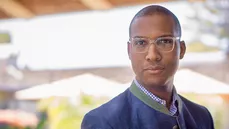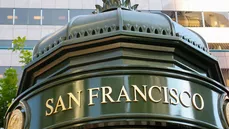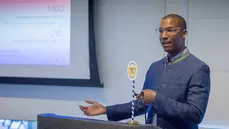James Mister started his Master studies in Sustainable Resource Management at TUM in 2012 and afterwards gained lots of practical experience in the Munich start-up scene as well as in global companies. When he returned to the US in 2016, he began working for the Bavarian Foreign Representation in San Francisco and has been building a bridge between the San Francisco Bay Area (USA West) and Bavaria ever since.

Please briefly describe your career path
After finishing my undergraduate degree in the US in 2010, I began working at think tanks focused on energy and climate research alongside scientists, policymakers, and members of the German Bundestag. Upon completing a master’s in Sustainable Resource Management at TUM, I began working at an electromobility startup in Munich, building on experience I gained working on urban transport IT products at Siemens and energy infrastructure projects at a global Austrian engineering consulting firm. By 2016 I decided to return to the US and soon began tech and life science focused EMEA/DACH market entry consulting for the Bavarian Ministry of Economic Affairs, Media, Energy and Technology (currently the Ministry of Economic Affairs, Regional Development and Energy). I now lead this 20 year tech and innovation outpost as Executive Director. Besides this, I am also a startup mentor, advisor, and burgeoning angel investor, all of which I find very rewarding.
What brought you to Silicon Valley?
Two things brought me here: pursuing new opportunities and beginning a new chapter.
I was propelled by the startup I worked for in Munich to take an opportunity to consult for the US-market-entry tech accelerator for German startups, which happened to be in the epicenter of Silicon Valley, Palo Alto. I was keen to explore the American work culture at the storied tech companies I’d known for well over a decade. I wanted to see how this culture existed in concert with the more “laid back” and nature-friendly West Coast lifestyle. I also happened to still have friends in graduate school in the region at Stanford and Berkeley, and still others working at tech companies like Google, Facebook, and Uber. So decided to head west!

In your opinion, what makes the area so special?
The mindset is something that is often cited as the clearest differentiator between Silicon Valley/San Francisco Bay Area and other tech hubs in the US and elsewhere. I am not sure about the extent to which that is still true. Nevertheless, to gain the most out of living here one should be open to new ideas and alternative ways of thinking, living, and problem solving. Some of the most accomplished and driven technologists and scientists believe in the ability to incubate and iterate ideas, file patents, establish companies, work hard to build something, and hope to change the world. This energy is infectious and has kept me motivated to reach my own full potential in work and life.
You currently work at Bavarian US Offices. Can you describe your remit?
I represent and report directly to the Bavarian Ministry of Economic Affairs, Regional Development and Energy in the US and focus on foreign direct investment (FDI) as well as trade promotion. I mostly support US tech firms on their European market entry, helping them establish DACH or EMEA central operations for the first time. I also support Bavarian SMEs/startups on market entry and fundraising and Bavarian corporations on innovation scouting. I attend conferences and events across the entire US and advise C-level executives, venture capitalists, and board members for the most part.
How have your studies at TUM prepared you for your following career?
TUM prepared me for my career because my time at the university taught me the value of following my passions, focusing on my strengths, honing my skills, and building a network. I also learned the invaluable art of pivoting: shifting your ideas or expectations in research or work to ensure optimal outcomes.
After completing compulsory modules in my master’s program, I relished the chance to pursue additional coursework in finance, innovation and entrepreneurship, as well as Mandarin Chinese, to round out my profile and deepen my expertise. I dove into better understanding the role of corporate finance and alterative asset investment on natural resource extraction and renewable energy planning. While writing my master’s thesis on the EU’s anti-subsidy and anti-dumping regulations against Chinese solar producers due to suspected unfair trade practices, I was able to pull from various parts of my studies.
Why did you choose to study in Germany, and why did you choose TUM?
I chose to study and live in Germany for several reasons. Foremost among these reasons is the fact that Germany has always been a pioneer in the renewable energy, urban transport, and climate resilience technology and applied research space. Secondly, I wanted to have a graduate degree from German-speaking Europe, as I knew I would either end up working between the US and Europe, likely in a German context. I also wanted to be in a large city that offered great transport, great cultural attractions, and nature (I love the Alps!), so TUM was my top choice for graduate school.
What was your goal after graduating from TUM?
My goal after TUM was to leverage what I learned in theory and practice either in a startup or management consulting. I was recruited by a few large consulting firms but decided to begin working at startups due to the great opportunity to learn, grow, and directly own the projects on which I worked. As with most university alumni, there is a great deal of change that takes places in the decade after finishing a degree, so the goals one sets are sometimes less important than what one ends up achieving. The latter is most likely also better or more aligned with one’s interests and passions.
